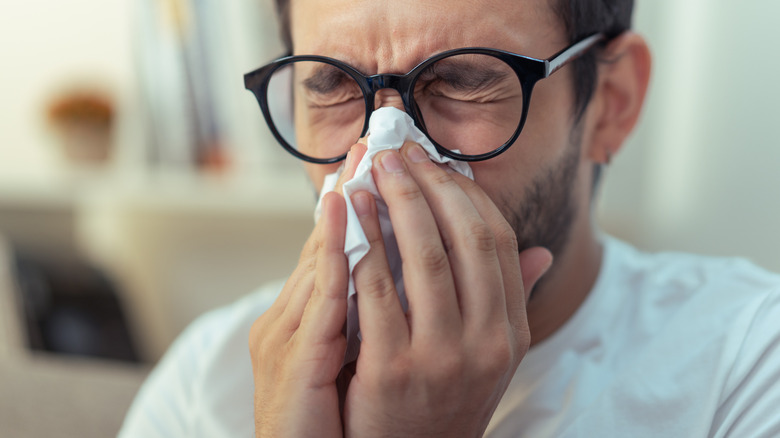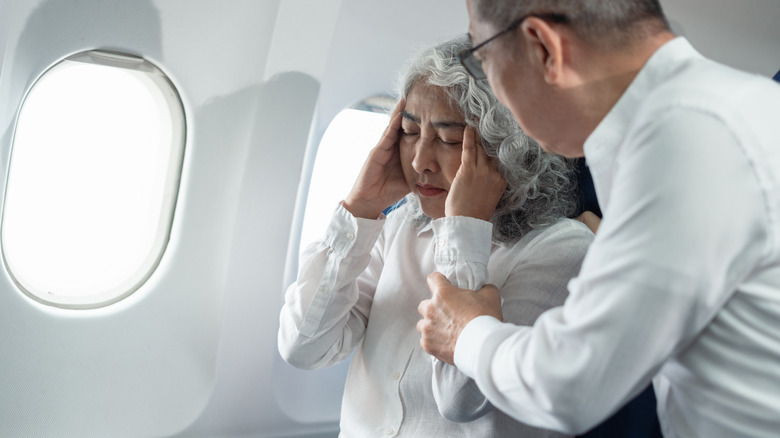Flying Sick? Flight Attendants Will Notice And It Could Affect Your Trip
Most travelers know they should probably avoid flying when seriously ill — especially in the aftermath of the COVID-19 pandemic, when global travel screeched to a halt in order to keep everyone safe. But what about those borderline cases? A lingering cold, mild allergies, or just feeling slightly under the weather? These gray areas can make the decision of whether or not to stay home a little more complicated.
And while you might think your health status is a private matter, that's not exactly the case when you're about to hop on a plane and share a confined space with hundreds of other people. That said, it makes sense that one of the first things flight attendants notice about you is whether you appear unwell before you've even set foot on the plane — and their observations can easily affect your travel plans.
In most cases, flight attendants are trained to keep a close watch for any visible signs of illness (like excessive coughing, difficulty breathing, or obvious distress) that might pose a risk. This assessment generally happens during boarding, when the crew can watch each passenger individually, identify any concerning symptoms from the get-go, and ultimately decide whether or not they're safe to come onboard.
What flight attendants look for and why it matters
Let's put it this way: Getting on a plane means you're about to share a tight space with lots of other people. This means that germs and illnesses can spread fast. With that in mind, airlines have to be extra careful about who (and what) they actually let onboard. For flight crews, this often means making some tough calls between simply letting a somewhat-sick passenger through or choosing to protect everyone else. And, yes, by "protect" we mean occasionally turning away passengers who are visibly unwell — although nobody enjoys having to do that.
In more serious cases, airlines can flat-out deny boarding to passengers who appear exceedingly ill and pose a clear health risk — especially travelers with obviously contagious symptoms who might also be more likely to experience a medical emergency on the flight. And although these decisions are made with everyone's safety in mind, they create a pretty complicated (and costly) situation for travelers. Especially considering that, in most cases, airlines are likely to charge unwell passengers a hefty fee for having to change their flight — even when it wasn't their choice to do so.
However, in cases where symptoms are mild, the added vigilance can often work in a sick passenger's favor. Depending on the severity of the symptoms, crew members can make special accommodations for anyone who's feeling a little under the weather, which is why you should always tell flight attendants if you feel sick during your flight. From providing you with extra water to ensuring easier bathroom access, or even arranging seat changes, clued-in flight attendants are likely to try and help make your journey as comfortable as possible.
Why flying sick isn't recommended anyway
Even if you do manage to board your flight while under the weather, it doesn't necessarily mean you're in the clear. Because, if being sick wasn't already bad enough, flying with an illness can actually make your symptoms worse. For starters, the pressurized cabin environment can intensify congestion, cause severe ear pain during takeoff and landing, and even make breathing even more difficult if you're already dealing with respiratory symptoms.
Along with that, flying itself can be physically demanding on your body. The cabin air is extremely dry, which can make sore throats feel even more coarse and uncomfortable, and the changes in air pressure can cause sinus pressure and ear pain that's especially intense if you're already congested. Throw in the fatigue from travel stress and potential time zone changes, and your body will have a much harder time fighting off the illness than if you'd just stayed home.
Lastly, there's also the matter of your own well-being. Basic cold symptoms that feel manageable on the ground can become more difficult at altitude. Although medicines like decongestant nasal sprays might help, they won't completely eliminate the discomfort. Plus, trying to equalize ear pressure while congested — something that happens naturally during takeoff and landing — can potentially lead to ear damage or severe pain. So while missing a flight is never fun, sometimes taking an extra day to recover might save you from an extremely uncomfortable journey.


